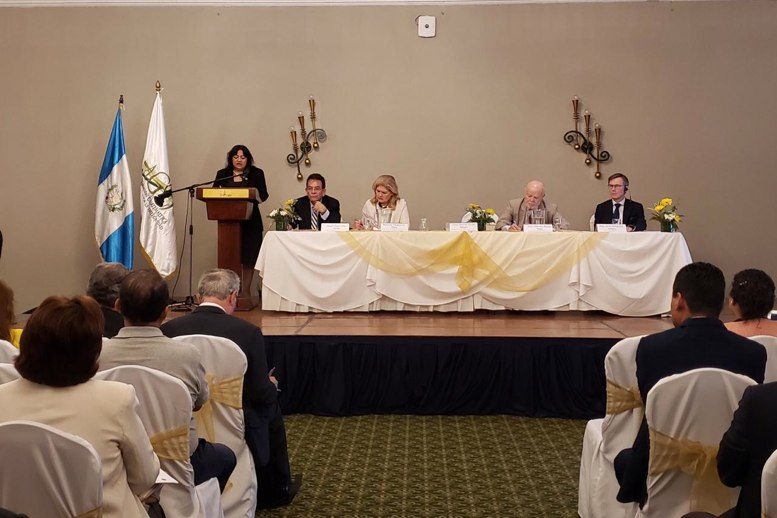
Oct 22, 2019 | News
On 25 and 26 October, the ICJ in Central America will hold the VII Regional Conference on Judicial Independence, with the central theme of the protection and security of Judges.
The Conference will discuss the role that governments should play in the protection of judges, as well as the relationship between judicial independence and security of those who deliver justice.
Participants from outside the region include Radmila Dragicevic Justice of the Supreme Court of Cassation of Serbia and Vice-President of the ICJ; José Antonio Martín Pallín, Judge Emeritus of the Spanish Supreme Court of Justice and ICJ Commissioner, and Erland Flaterud and Finn Arne Schanche, both judges from Norway.
Nine other judges from Central America will attend, including Leonardo Ramírez of the Supreme Court of Justice of El Salvador Murcia and Fernando Cruz Castro, President of the Supreme Court of Justice of Costa Rica.
The ICJ regrets that the Supreme Court of Justice of Guatemala has not been in a position to receive this important delegation at its plenary on 23 October to address the issue of the security of judges.
The ICJ recalls that this Conference is held within the framework of a letter of cooperation and understanding agreed with the former President of the Judicial Branch and the Supreme Court of Justice, Ranulfo Rojas Cetina in 2015.
The ICJ is particularly concerned that there is presently an unfilled vacancy for Chief of Security for the judiciary, following the resignation of the former Chief who had allegedly engaged in conduct not consistent with his function.
Ramón Cadena, Director of the ICJ for Central America, said: “It is the duty of the Supreme Court of Justice to inform the Guatemalan public about the Judges Protection System, so that it does not become a source of corruption or in any way interferes with the work of independent, and impartial judges.”
In Guatemala, the international delegation will meet with judges such as Yassmín Barrios, Ericka Aifán, Miguel Ángel Gálvez, Carlos Ruano and Pablo Xitumul among others. They have been the subject of seemingly unfounded complaints which have posed risks to their personal security and independent judicial functioning.
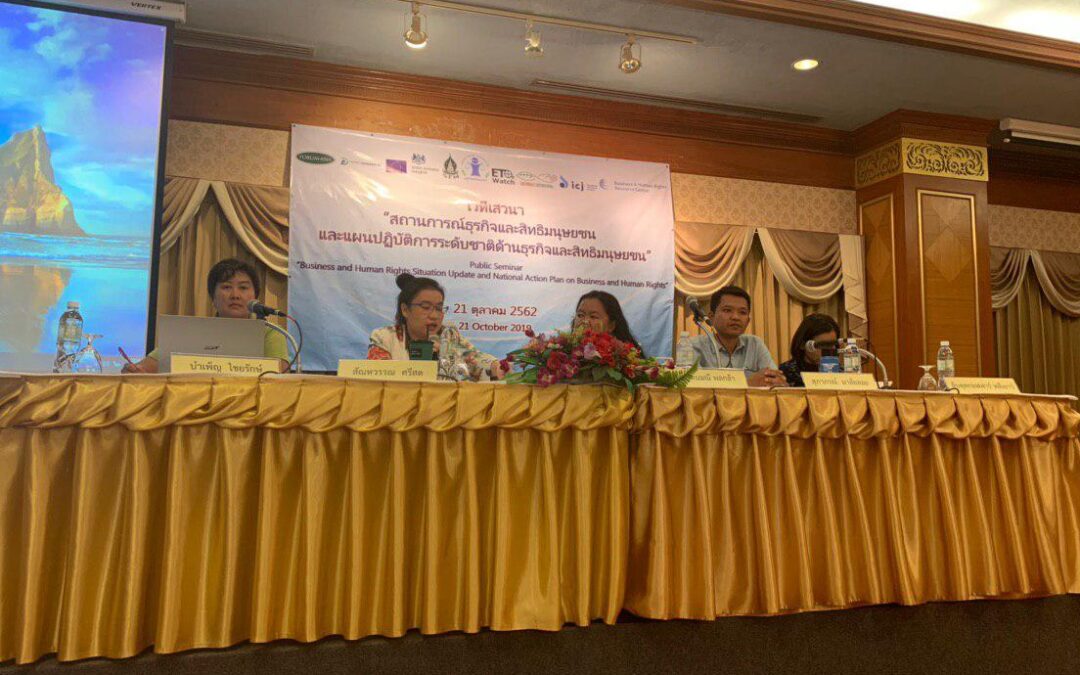
Oct 22, 2019 | Advocacy, News
On 21 October 2019, the ICJ co-hosted an event on “Business and Human Rights and Thailand’s National Action Plan on Business and Human Rights” at Mido Hotel in Bangkok.
The discussion surrounded the evolution of business and human rights in Thailand and concerns arising with respect to the National Action Plan on Business and Human Rights (‘NAP’)’s key priority issues.
Notably, on the same day of this event, the NAP was being considered by the Cabinet for approval.
Participants included 37 individuals representing affected populations from all regions of Thailand, members of civil society organizations, and representatives from international organizations.
Sanhawan Srisod, ICJ’s Legal Adviser, spoke at a panel on ‘Land, Environment and Natural Resources’, addressing key concerns arising with respect to environmental laws in Thailand. These included the lack of adequate consultations with affected stakeholders before implementing development projects, inadequate assessment of environmental impacts prior to policy determination, inadequate protections under relevant laws on the environment, problems arising from Environmental Impact Assessment (EIA) and Environmental and Health Impact Assessment (EHIA) processes, and obstacles in accessing remedy for environment-related cases. She also facilitated another panel on judicial harassment of human rights defenders.
Saovanee Kaewjullakarn, ICJ’s Legal Consultant, facilitated a panel on Thai outbound investment and challenges with respect to access to justice for victims of human rights abuses committed by Thai corporations in the context of their business activities abroad.
The event was co-hosted with the Community Resource Centre Foundation (CRC), Spirit in Education Movement (SEM), Thai Extra-Territorial Obligations Working Group (Thai ETOs Watch), EarthRights International (ERI), Asian Forum for Human Rights and Development (FORUM-ASIA), Business and Human Rights Resource Center (BHRRC) and the British Embassy in Thailand.
Background
After the event, on 29 October 2019, the Cabinet approved and adopted the First National Action Plan on Business and Human Rights (2019-2022), making Thailand the first country in Asia to adopt the stand-alone NAP.
The NAP sets out plans to be followed by several public and private stakeholders in order to ensure the state’s and business’s duty to protect and respect human rights, and the general obligation of the State and businesses to provide for access to remedy in the case of business-related human rights violations and abuses. NAP has determined four key priority issues, including (1) Labor; (2) Land, environment and natural resources; (3) Human rights defenders; and (4) Cross border investment and multi-national enterprises.
Subject to these four key priority issues, the NAP emphasizes the duties of the relevant State agencies to, inter alia, review and amend certain laws, regulations and orders that are not in compliance with human rights laws and standards and ensure their full implementation, ensure mechanisms for redress and accountability for damage done to affected communities and individuals, overcome the barriers to meaningful participation of communities and key affected populations, and strengthen the role of businesses to “respect” human rights on a variety of key priority issues.
Its effectiveness in term of implementation is yet to be assessed because the NAP does not have the status of a law, but is merely a resolution from the executive branch. Under Thai law, a Cabinet Resolution is considered a “by-law” in accordance with section 3 of the Act on Establishment of Administrative Courts and Administrative Court Procedure, B.E. 2542 (1999).
In March 2019, the ICJ and Human Rights Lawyers’ Association (HRLA) had also submitted recommendations to the Ministry of Justice on Thailand’s draft NAP and expressed concern on the removal of a commitment that had been included in earlier versions of the NAP to “push for an Anti- Strategic Litigation against Public Participation (SLAPP) law”.
Further reading:
Thailand: ICJ hosts discussion on human rights consequences of Special Investment Zones
Thailand’s Legal Frameworks on Corporate Accountability for Outbound Investments
Thailand: ICJ and HRLA express concern about inadequate protections for human rights defenders in draft National Action Plan on Business and Human Rights
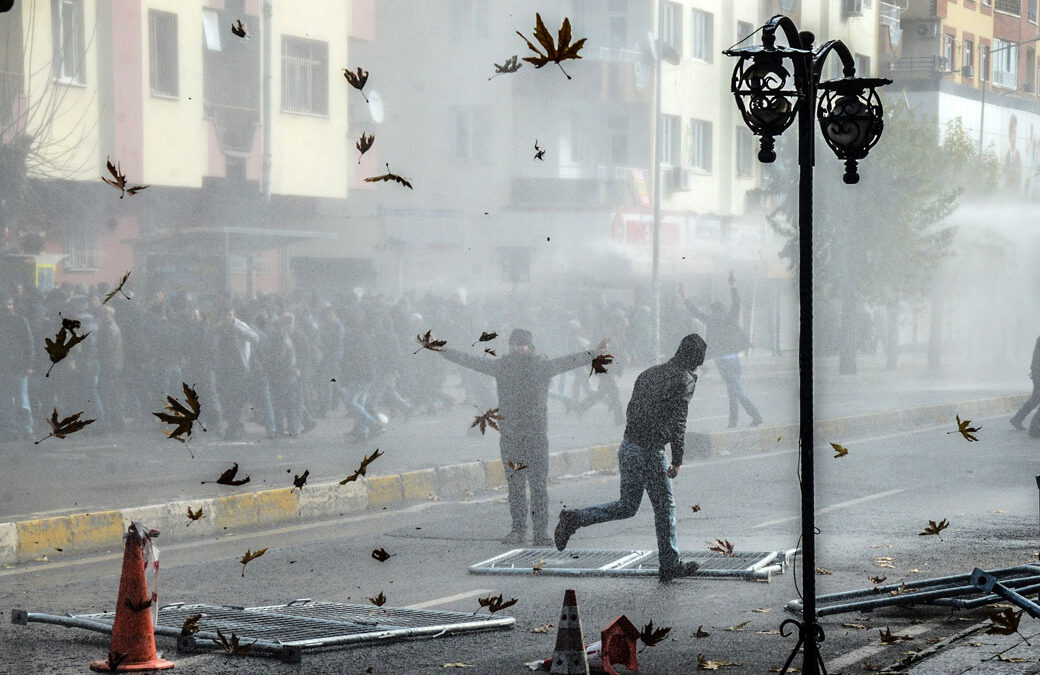
Oct 21, 2019 | News
The ICJ has condemned the arbitrary arrest of at least 186 individuals – 24 of whom are still detained solely for their opinions publicly expressed against the Turkish intervention in northern Syria. The ICJ calls for their immediate and unconditional release and for all charges against them to be dropped.
At least 186 individuals had been arrested by Turkish authorities by 16 October after publicly criticizing Turkey’s military intervention in northern Syria.
They are accused of “provoking the public to hatred and animosity”, “carrying out propaganda for a terrorist organization” and “openly degrading the State of the Republic of Turkey” as prohibited by Articles 216, 220, 301 and 314 of the Turkish Penal Code and Article 7/2 of Prevention of Terrorism Law. Further such arrests are reportedly continuing.
Moreover, an investigation was launched against Istanbul MP Sezgin Tanrıkulu, a member of the main opposition Republican People’s Party (CHP), due to his social media messages and statements. HDP co-chairs and MPs were also investigated over “terrorism links” for their statements on the Peace Spring Operation.
“The Turkish Penal Code and Prevention of Terrorism Law in particular with their overly broad definition of terrorism, place excessively restrictive limitations on the exercise of the right to freedom of expression protected under Article 26 of the Turkish Constitution and give law-enforcement bodies sweeping powers to proceed to arbitrary arrests,” said Massimo Frigo, Senior Legal Adviser of the ICJ Europe and Central Asia Programme.
The ICJ is concerned that these arrests have been undertaken in contravention of the right to freedom of expression under article 19 of the International Covenant on Civil and Political Rights (ICCPR) and article 10 of the European Convention on Human Rights (ECHR), treaties to which Turkey is party.
In particular, these restrictions do not appear to be necessary in a democratic society and proportionate, as required by international law.
Detention ordered in breach of these rights is also inherently arbitrary and therefore not in line with Turkey’s obligations to respect the right to liberty under Article 9 ICCPR and Article 5 ECHR.
“These prosecutions violate the Turkish Constitution and international law and should be immediately dropped”, said Massimo Frigo.
“As a priority identified in its Judicial Reform Strategy, Turkey must also quickly abrogate these criminal provisions that cause undue and arbitrary restrictions on freedom of expression,” he added.
The ICJ recalled that the Venice Commission, in its 2016 report, concluded that the provisions of the Turkish Penal Code under which they are charged “provide for excessive sanctions and have been applied too widely, penalizing conduct protected” under international human rights law.
Similar issues were identified last July by Turkey’s Constitutional Court regarding prosecution for terrorism propaganda, of signatories of a petition calling for peace (the “Academics for Peace” petition) in the southeastern part of the country.
The Constitutional Court ruled that the criminal proceedings violated the right to freedom of expression safeguarded by Article 26 of the Turkish Constitution.
Contact:
Róisín Pillay, Director, ICJ Europe Programme, t +32 476 974263; e roisin.pillay(a)icj.org

Oct 21, 2019 | News
A new briefing paper by the ICJ calls upon Myanmar authorities to ensure that the right to freedom of thought, conscience, religion or belief and respect for culture and tradition are never used as pretexts to justify discrimination and violence in the country.
“The analysis in the ICJ’s paper makes clear why there is a pressing need for Myanmar authorities to undertake significant legal and practical reforms, to ensure that all people can exercise their freedom of religion and belief and enjoy equal protection of their human rights,” said Frederick Rawski, Asia Pacific Region Director for the ICJ.
The paper focuses its analysis on two particular sets of laws – the colonial era ‘blasphemy’ laws, which in recent years have also been used as one of the several measures to restrict free speech and the controversial ‘race and religions laws’ passed in the run up to the national elections in 2015, particularly those related to religious conversion and marriage of Buddhist women.
“The briefing paper highlights a number of laws in Myanmar that impair the enjoyment of the right to freedom of religion or belief’’, said Canadian Member of Parliament David Anderson, Chair of the International Panel of Parliamentarians for Freedom of Religion or Belief Steering Committee, which supported production of the paper.
In recent years, Myanmar courts have convicted individuals under ‘blasphemy’ provisions even in the absence of any evidence of deliberate and malicious intent to insult a religion, let alone on the basis of irrefutable evidence of incitement to violence, hostility or discrimination on religious grounds.
In addition to the use of colonial-era blasphemy laws, Myanmar has a more recent set of four laws that appear to specifically target non-Buddhists, and particularly the Muslim community. While all four laws give rise to concerns about the right to freedom of thought, conscience, religion or belief, the laws related to conversion and marriage are the most problematic.
The briefing paper also identifies a number of other challenges related to the protection and promotion of the right to freedom of religion or belief in Myanmar. These include:
- Highly discriminatory legal arrangements for citizenship and the rights of residents in Myanmar;
- Arbitrary restrictions on places of worship, mostly for Christians and Muslims;
- Preferential treatment of Buddhism, for example in the national school curriculum.
In light of these challenges, the briefing paper offers 11 key recommendations to the Government of Myanmar in ensuring that Myanmar’s legal framework is implemented in accordance with international human rights law and fully protects the right to freedom of religion or belief.
This report is part of a series of ICJ publications on the right to freedom of religion or belief.
Contact
Frederick Rawski, Asia Pacific Director for the ICJ, frederick.rawski(a)icj.org
Liv H. Kvanvig, Coordinator, IPPFoRB, lk(a)nhc.no
Palak Rao, Communications and Advocacy Adviser, IPPFoRB, pr(a)nhc.no
Download
New Briefing paper on Challenges to Freedom of Religion or Belief in Myanmar
See also
New primer on Freedom of Religion or Belief in International Human Rights Law
New Briefing paper on Challenges to Freedom of Religion or Belief in Malaysia
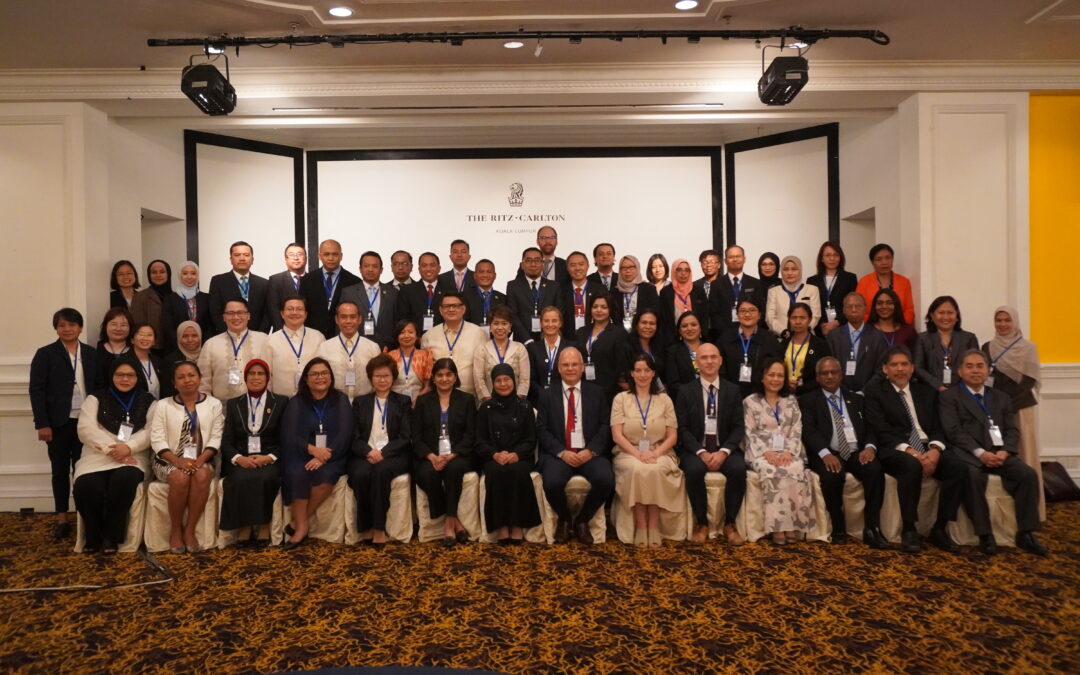
Oct 20, 2019 | Advocacy, News
From 18 and 19 October 2019, the ICJ, in collaboration with UN Women and the Federal Court of Malaysia, convened the 2019 Southeast Asia Regional Judicial Dialogue in Kuala Lumpur, Malaysia.
The judges from Malaysia, Philippines, Indonesia, and Timor-Leste discussed how to apply the Convention on the Elimination of All Forms of Discrimination against Women (CEDAW) and other international legal instruments in their work at the domestic level to eliminate the negative impact of stereotyping and gender bias in the judiciary.
“We need to ensure that CEDAW and international human rights obligations are fully applied by national authorities, and not just taken as aspiration or long-term goal,” said Frederick Rawski, ICJ Regional Director for Asia and the Pacific.
“These standards need to have the force of law and made real, in workplace and in domestic settings, to ensure that women are free from violence and that there is access to justice when violence does occur.”
The judicial dialogue was opened by Malaysia’s first female Chief Justice, The Right Honourable Tan Sri Tengku Maimun binti Tuan Mat. The Chief Justice emphasized during her keynote speech the need for regular capacity strengthening initiatives for judges to be aware of gender-related issues. She emphasized further that “Judicial stereotyping can undermine the ability of women to exercise and enforce other rights guaranteed by law.”
This message was echoed by Carla Silbert of UN Women who said: “We see that women are often impacted disproportionately and thus judges should uphold women’s rights as human rights. It is a crucial role for the court to deliver justice with gender sensitivity.”
ICJ Commissioner Dato Ambiga Sreenavasan and the Ambassador of Sweden to Malaysia, Dag Juhlin-Dannfelt addressed the ongoing reforms in Malaysia and gender equality.
“Malaysia has its first female Chief Justice and has shown a remarkable growth of female leaders in influential positions. However, the participation of women in the labor workforce is still very low and it remains a challenge for us,” said Dato Ambiga Sreenavasan, Commissioner of the ICJ.
“The drive for democracy is to support and strengthen gender equality and the rule of law,” said Ambassador Dag Juhlin-Dannfelt. “ICJ’s Bangkok General Guidance for Judges on Applying a Gender Perspective in Southeast Asia is an important tool to address gender equality in judiciary.”
The dialogue included discussion on the topics of equality & non-discrimination, access to justice under international human rights law, gender stereotyping and gender discriminatory practices in cases involving women who are victims of trafficking.
Many participating judges said that they would be applying in their judicial work the tools introduced to them in the dialogue, including the Bangkok General Guidance. These could be used in decision-making, assessing evidence presented before them, and handling witnesses in their courts. Some also said that they plan to disseminate the information and tools to their colleagues in the judiciary.
Contact
Boram Jang, International Legal Adviser, Asia & the Pacific Programme, e: boram.jang(a)icj.org
Resources:
To access pictures from the event, click here.
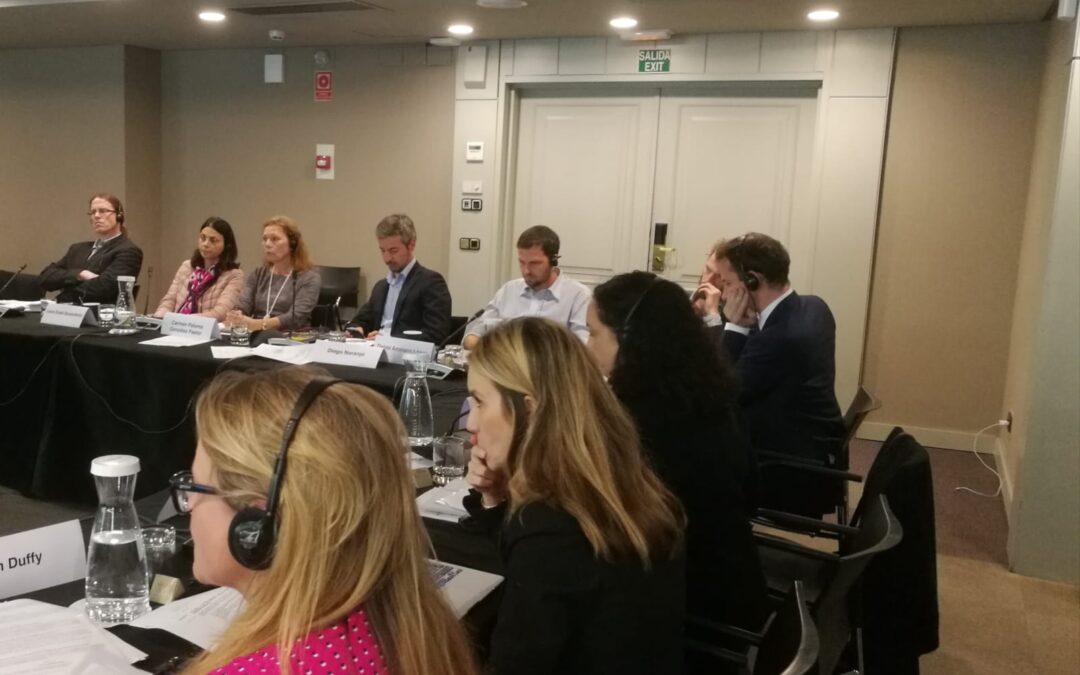
Oct 19, 2019 | Events, News
On 18 October, Scuola Superiore Sant’Anna, Juezas y Jueces para la Democracia and the ICJ held a a closed-door roundtable discussion in Madrid on the impact of the application of counter terrorism legislation on freedom of expression and association: implementing the EU Directive 2017/541 on combating terrorism.
The discussion took place in the framework of the EU funded project “Judges Uniting to Stop Terrorism with International, Constitutional and European law (JUSTICE) project”.
Judges, prosecutors and lawyers from 10 EU countries shared their practices and experiences in the implementation of the EU Directive 2017/541 on combating terrorism and the application of counter-terrorism legislation and its impact on freedom of expression and association, including humanitarian work within the different legal systems of the European Union (EU) Member States.
The discussion covered the offences of glorification of terrorism and apology for terrorism and its different implementation in various jurisdictions and how legal certainty and proportionality can be ensured. The roundtable further focused on the freedom of expression on-line and the impact of the application of counter-terrorism law on freedom of association and legitimate activities, including humanitarian assistance. These practices were be assessed in light of international human rights law principles in order to identify best practices that could be promoted throughout the EU.
This was a third out of four round-tables organized within this project between April and November 2019 by the ICJ and partners.
See the agenda here.










